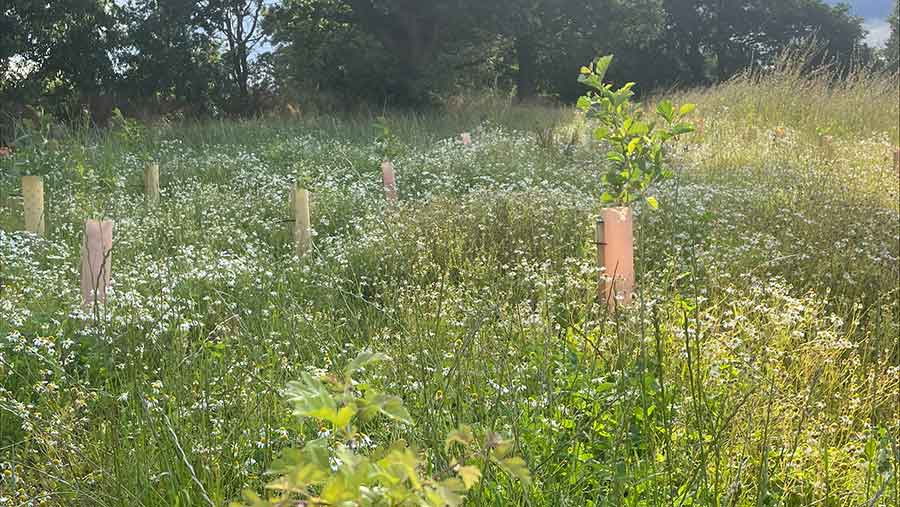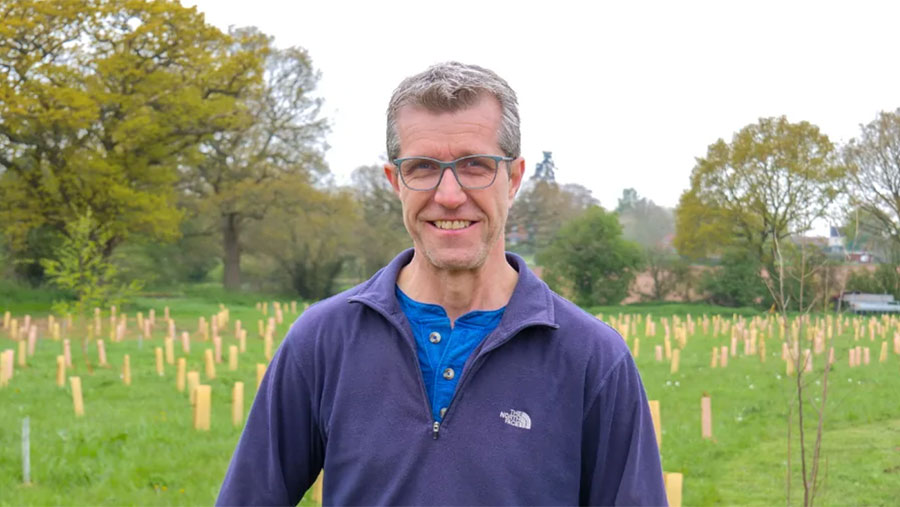Advertiser content
Farm creates nature-positive woodland with biomass offshoot
Provided by
Trees should be in every farmer’s toolbox. They boost productivity, resilience and the health of the environment – with no need to trade off with production.
If you’re looking to plant lots of trees, we have the trees, grants and funding schemes to help. Our expert advisers can help you put the right trees in the right place to achieve your goals.
Increase biodiversity, provide shelter, prevent soil erosion, reduce flooding and much more with the Woodland Trust.
 © The Woodland Trust
© The Woodland Trust Mark Lea and his wife Liz have been farming organically at Green Acres, in Shropshire, since 2000.
Their 175ha farm is certified organic mixed arable and sheep, with around 130ha dedicated to combinable crops in a five-year arable rotation including clover-based leys for seed, silage or grazing, as well as combinable wheat, oats and peas.
Mark is the third generation of his family to run the farm, following in the footsteps of his father and grandfather.

Mark Lea © The Woodland Trust
Organic credentials
Green Acres hasn’t always been organic – it converted from conventional farming production in 2000, which Mark says was partly a business decision, to move away from conventional commodity grain production as they were too small to be competitive; but also largely influenced by the impact of intensive arable farming on the environment.
The farm is now heavily committed to agri-environment and stewardship schemes and intends to remain involved in Defra schemes when it comes to funded environmental work.
Working with the Woodland Trust
Green Acres has undertaken a small degree of agroforestry, planting avenues of trees with some previous support from the Woodland Trust. Mark commented:
“Liz and I created a small woodland 8–9 years ago, and this project made us realise how much difference a planting such as this could make in under 10 years; it proved that change can happen sooner than you might think.”
It was the success of this small-scale woodland that made them decide to add another.
This time around, while researching planting advice, Mark came across the Woodland Trust’s MOREwoods scheme, funded by Lloyds Bank, which seemed to be the perfect fit for woodland of this scale.
“I completed the application form online in autumn 2022 and was contacted by our local Woodland Trust adviser Jack Starbuck to discuss the idea I had already mapped out,” Mark explains.
Jack then visited the site to support in evolving the plan Mark had put together and provided advice on suitable species.
Creating the woodland
In February this year, over 800 trees were planted with support from the Woodland Trust on an unproductive area of the farm that Mark describes as a “wasteland”.
The farm has a biomass boiler so Mark wanted the woodland to have a productive element, and intends to coppice it in the future, so he opted for species suitable for coppicing – including hazel, alder and maple.
The remaining species were a significant amount of silver birch, followed by oak, crab apple, rowan, and a few leftover saplings from previous plantings.
The couple intended to make it as positive a project as possible, with the aim to add value throughout the whole process.
They had already established a flowering grass mix around two years previously, which provided quite a degree of pollen and nectar and have sown more wildflowers in between the trees post-planting to support biodiversity.

© The Woodland Trust
The woodland won’t be grazed for the time being, as the trees are too young to support it, but the trees have been planted in 1.8m avenues to allow Mark to mow between the rows for the first 2–3 years.
“As an organic farm, Green Acres cannot spot spray, so I find mowing to be the most effective option,” Mark explains.
“Once the trees have matured a little more, and are less susceptible to the effects of competition, the grass will be left to its own devices to promote biodiversity.”
The trees have also been mulched with bark chippings to assist with weed control and moisture loss.
Community values
The farm works hard at being a part of the local community, so Mark asked for volunteers to help with the planting. There was a tremendous turnout, with over 30 people helping out, so planting was completed within a day.
“This just goes to prove how helping the environment in such a way makes people feel good. It’s a really powerful thing to be able to harness that positivity and pass it along to others,” Mark shares.
Local school groups have also been invited to use the area for educational purposes, with children studying the woodland as it develops, to see the impact that it has on nature.
Future plans
Next year, Mark and Liz intend to add an area of willow and poplar for biomass production; it’s a more commercial plan than this year’s project, but generally they intend to continue planting annually, and will be evolving into new countryside stewardship next year.
Mark hopes this will provide an opportunity to get some new capital payments, new ideas and new plantings – ideally incorporating a bit more agroforestry, woodland, biomass, and more hedging.
“We absolutely wouldn’t hesitate to apply for further MOREwoods and MOREhedges schemes to help fund this, given the positive experiences we have had with the Woodland Trust,” he says.
Ready to start your planting journey?
If you’re considering planting trees on your land, MOREwoods provides tailored advice and guidance from local woodland creation advisers along with the trees and tree protection you need for your project – and covers up to 75% of costs.
The Woodland Trust, Kempton Way, Grantham, Lincolnshire NG31 6LL.
The Woodland Trust logo is a registered trademark. The Woodland Trust is a charity registered in England and Wales number 294344 and in Scotland number SC038885. A non-profit-making company limited by guarantee.
